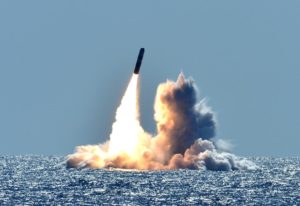
Aerojet supplies advanced rocket propulsion systems, which are critical components for the missiles made by Lockheed and other defense contractors and aerospace companies. The agency alleges in its complaint that if the deal is allowed to proceed, Lockheed will use its control of Aerojet to harm rival defense contractors and further consolidate multiple markets critical to national security and defense. This is the agency’s first litigated defense merger challenge in decades.
“The FTC is suing to block Lockheed Martin, the world’s largest defense contractor, from eliminating Aerojet, our nation’s last independent supplier of key missile inputs,” said Holly Vedova, FTC’s bureau of competition director in a statement. “Lockheed is one of a few missile middlemen the U.S. military relies on to supply vital weapons that keep our country safe. If consummated, this deal would give Lockheed the ability to cut off other defense contractors from the critical components they need to build competing missiles. Without competitive pressure, Lockheed can jack up the price the U.S. government has to pay, while delivering lower quality and less innovation. We cannot afford to allow further concentration in markets critical to our national security and defense.”
The U.S. Department of Defense reviewed the acquisition and considered its potential impact on national security, competition, and innovation. DoD’s assessment was provided to the FTC for its deliberations and final decision-making.
“I deeply appreciate the collaborative relationship between DoD and FTC staff who worked closely throughout this investigation,” said Director Vedova. “The FTC determined that the proposed transaction harms competition for several weapons systems that DoD relies on to defend the nation and there is no sufficient remedy to alleviate those harms.”
Lockheed is the world’s largest defense contractor and a leading missile supplier in a highly concentrated sector. Lockheed, and its U.S missile competitors—Raytheon, Northrop Grumman, and Boeing—act as missile system contractors to DoD. These prime contractors are key intermediaries between the U.S. government and the rest of the missile systems supply chain, including the subcontractors such as Aerojet which provide system components to them. DoD relies on prime contractors to develop, produce, sustain, and source a variety of weapons, including missile systems, hypersonic cruise missiles, and missile defense kill vehicles. Each of these weapons depend on critical propulsion technologies of the type supplied by Aerojet.
Few Competitors
Aerojet and only one other competitor—Northrop Grumman—compete to provide propulsion engines for missile systems and hypersonic cruise missiles to defense contractors. Lockheed’s proposed acquisition of Aerojet would give Lockheed control over critical propulsion inputs that its rivals require to compete against Lockheed. Specifically, the complaint alleges that the proposed acquisition would give Lockheed “the ability and incentive to deny, limit, or otherwise disadvantage competitors’ access to critical propulsion inputs for various weapons systems.” The combined firm could harm rivals by affecting the price or quality of the product, the quality of the engineering support, and the schedule and contract terms for developing and supplying it or otherwise disadvantage its rivals. As a subcontractor, Aerojet also has had access to prime contractors’ sensitive information about technological advancements, cost, schedule, and business strategies. The complaint alleges that post-acquisition, “Lockheed would have an incentive to exploit its access to its rivals’ proprietary information to gain an advantage in competitions against them.”
The U.S. government in turn would be harmed because the cost of missile systems, missile defense kill vehicles, and hypersonic cruise missiles would likely increase, innovation would be lessened, and quality would be reduced, hindering national security and defense interests.
The Commission vote to issue the administrative complaint and to authorize staff to seek a preliminary injunction was four to zero. The FTC will file a complaint in the U.S. District Court for the District of Columbia seeking a preliminary injunction to stop the deal pending an administrative trial. The administrative trial is scheduled to begin on June 16, 2022. ![]()

